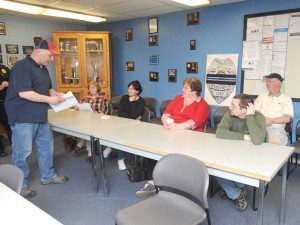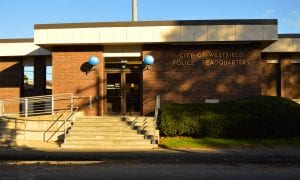
Det. Brian Freeman distributes information to some of the victims of house breaks who attended a meeting to learn about the progress of the investigations into the crimes in their homes. (Photo by Carl E.Hartdegen)
WESTFIELD – It may be hard for crime victims to understand why charges have not been brought after a suspect has been identified so city detectives recently staged a meeting for victims of recent larcenies.
Det. Sgt. Stephen K. Dickinson was the host of the meeting and explained that police have identified two pairs of men who are believed to be responsible for the majority of the housebreaks in the city over the past several months.
The suspects have not been charged with all the reported crimes and Dickinson said that he understands the frustration of the victims who may wonder why they were charged with some break-ins but not the crime at their home.
Dickinson explained that charges usually depend on physical evidence so, for example, if a footprint was found at one house a suspect might be charged for a break-in there but, even if the house next door was broken into on the same day, charges may not be brought for the second house because no physical evidence was found there.
However, Det. Brian Freeman pointed out that in some cases there is evidence – “we have DNA evidence, we have footprints and we have fingerprints” – awaiting examination at the State Police crime lab. The lab was not expected to yield any information for “eight months to a year” before the Boston bombings and “the Boston thing isn’t helping us” so it is too soon to know if police will be able to bring charges for some of the break-ins.
Freeman also told the victims that they will be asked to complete victim impact statements so that “your voice will be heard before the sentence is handed out.”
Some of the victims pointed out that the criminals have robbed them of their sense of security and they are now in fear of another break-in.
“These people have destroyed my refuge” Robert Poth said. “and I will never be the same.”
Dickinson said that it is unlikely that the victims will be victimized again by the same criminals because “these guys are locked up” and “because they already know what you’ve got and they took what they needed.”
He said that suspects who have been arrested were burgling houses because they are heroin addicts and spend their days in search of a way to get their drug so they hit a house “and then they move on.”
Dickinson said that there are several steps that can be taken to minimize the risk of additional break ins.
He said that although alarm systems are an option there are less expensive measures which can also be effective.
Lt. Jerome Pitoniak explained a camera system which, for a one-time charge, can be purchased and set up to send an image to a smartphone when it senses motion.
Dickinson said that creating the illusion of occupancy can be effective in deterring break-ins because thieves do not want to find somebody home when they break in.
He recommends that lights be left on – or set to come on and off by timers – and also recommended that a radio or television be left on when a resident leaves.
“The big key is talking with your neighbors,” he said. “letting them know if you’re going to be away for any extended period of time.”






